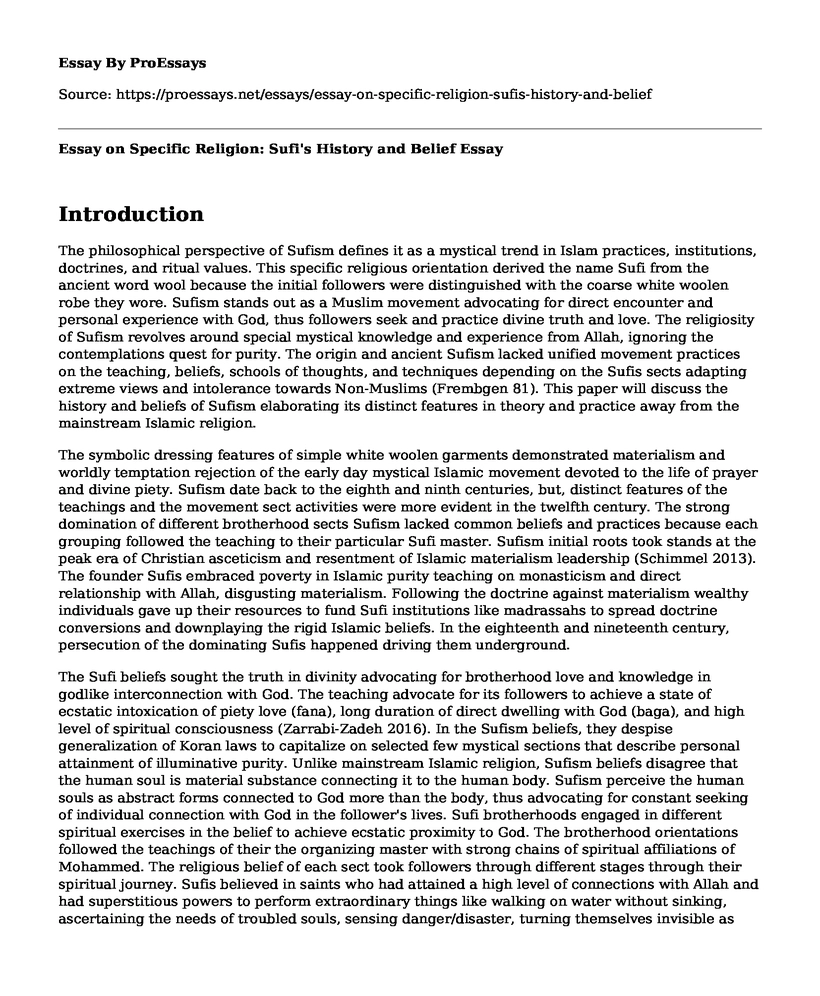Introduction
The philosophical perspective of Sufism defines it as a mystical trend in Islam practices, institutions, doctrines, and ritual values. This specific religious orientation derived the name Sufi from the ancient word wool because the initial followers were distinguished with the coarse white woolen robe they wore. Sufism stands out as a Muslim movement advocating for direct encounter and personal experience with God, thus followers seek and practice divine truth and love. The religiosity of Sufism revolves around special mystical knowledge and experience from Allah, ignoring the contemplations quest for purity. The origin and ancient Sufism lacked unified movement practices on the teaching, beliefs, schools of thoughts, and techniques depending on the Sufis sects adapting extreme views and intolerance towards Non-Muslims (Frembgen 81). This paper will discuss the history and beliefs of Sufism elaborating its distinct features in theory and practice away from the mainstream Islamic religion.
The symbolic dressing features of simple white woolen garments demonstrated materialism and worldly temptation rejection of the early day mystical Islamic movement devoted to the life of prayer and divine piety. Sufism date back to the eighth and ninth centuries, but, distinct features of the teachings and the movement sect activities were more evident in the twelfth century. The strong domination of different brotherhood sects Sufism lacked common beliefs and practices because each grouping followed the teaching to their particular Sufi master. Sufism initial roots took stands at the peak era of Christian asceticism and resentment of Islamic materialism leadership (Schimmel 2013). The founder Sufis embraced poverty in Islamic purity teaching on monasticism and direct relationship with Allah, disgusting materialism. Following the doctrine against materialism wealthy individuals gave up their resources to fund Sufi institutions like madrassahs to spread doctrine conversions and downplaying the rigid Islamic beliefs. In the eighteenth and nineteenth century, persecution of the dominating Sufis happened driving them underground.
The Sufi beliefs sought the truth in divinity advocating for brotherhood love and knowledge in godlike interconnection with God. The teaching advocate for its followers to achieve a state of ecstatic intoxication of piety love (fana), long duration of direct dwelling with God (baga), and high level of spiritual consciousness (Zarrabi-Zadeh 2016). In the Sufism beliefs, they despise generalization of Koran laws to capitalize on selected few mystical sections that describe personal attainment of illuminative purity. Unlike mainstream Islamic religion, Sufism beliefs disagree that the human soul is material substance connecting it to the human body. Sufism perceive the human souls as abstract forms connected to God more than the body, thus advocating for constant seeking of individual connection with God in the follower's lives. Sufi brotherhoods engaged in different spiritual exercises in the belief to achieve ecstatic proximity to God. The brotherhood orientations followed the teachings of their the organizing master with strong chains of spiritual affiliations of Mohammed. The religious belief of each sect took followers through different stages through their spiritual journey. Sufis believed in saints who had attained a high level of connections with Allah and had superstitious powers to perform extraordinary things like walking on water without sinking, ascertaining the needs of troubled souls, sensing danger/disaster, turning themselves invisible as well as healing the sick. These perceptions were founded on the beliefs that maintaining purity and cross connection with God made a person equal or have divine abilities.
Conclusion
In conclusion, the origin and beliefs of Sufism derive the teachings from the mainstream Islamic religion to form a specific sub-group of a religious sect that advocated in leaving the traditional materialistic ideologies to poverty brotherhood to maintain purity and divine connection with God.
Works Cited
Frembgen, J. W. (2012). Dhamal and the performing body: Trance dance in the devotional Sufi practice of Pakistan. Journal of Sufi Studies, 1, 77-85.
Schimmel, Annemarie. Mystical Dimension of Islam. Noura Books, 2013. ISBN 978-979-433-797-4.
Zarrabi-Zadeh, Saeed. Practical Mysticism in Islam and Christianity: A Comparative Study of Jalal al-Din Rumi and Meister Eckhart. Routledge: Routledge Sufi Series, 2016. ISBN 978-1-13-810012-1
Cite this page
Essay on Specific Religion: Sufi's History and Belief. (2022, Jun 19). Retrieved from https://proessays.net/essays/essay-on-specific-religion-sufis-history-and-belief
If you are the original author of this essay and no longer wish to have it published on the ProEssays website, please click below to request its removal:
- Response to McCloskey's on Being an Atheist Essay
- China Religions and Beliefs Essay Example
- Essays on a Tribute to Native Americans and Buddhist and Christian Non-violent Social Theory
- Essay Sample on Muslims Defend Quran's Inimitability & Prophecy to Counter Religious Attacks
- Essay Example on Christianity: Shaping Culture with Purpose and Intent
- Paper Sample on Bible's Approach to Human Rights: Women, Slavery, Minorities
- A Pragmatic Philosophical Worldview: Concerned With Truth and Effectively Addressing Problems - Free Report







